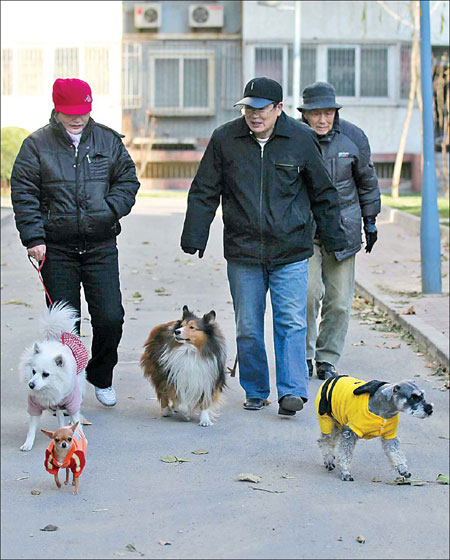Canine therapy
Updated: 2011-12-11 07:49
By Mary Katherine Smith, Shi Yingying and Yang Yijun (China Daily)
|
|||||||||
|
Three seniors walk their four dogs, all appropriately attired for winter. The animals find companionship and their owners share common ground. Wang Jing / China Daily |
They are retired, their children grown and flown, and they have little to occupy their time. For some, they turn to four-legged companion who keep them socially active and healthy. Our Shanghai team of Mary Katherine Smith, Shi Yingying and Yang Yijun reports.
As the sun sets on the Shanghai skyline and the hundreds of workers inside The Center depart the most expensive office building in city to start their commute home, another group makes their way to the building's surrounding courtyard. Their graying hair and slow pace suggest it has been a long time since they were last working hard in an office. And they do not come with small children in strollers as many others do. Instead they bring another important family member - the dog.
| ||||
In this courtyard in the heart of the French Concession and the bustling downtown area, old Shanghai residents congregate with their canine companions every morning and evening. It's a good way to socialize with old friends and also let their dogs meet and play.
Many are taking care of dogs their children had bought. One woman surnamed Wang looks after her daughter's dog Seven, a West Highland terrier that is almost two.
"I thought about going back to work and getting another job," Wang says. "But my daughter asked me to stay home and take care of Seven instead."
Her daughter bought the terrier while still living with her parents, but she has since married and is living in Pudong. Seven lives permanently with Wang and the puppy never leaves her side. In fact the only time they were apart recently was during her daughter's wedding ceremony.
"I don't want Seven to be alone," she says. And with her daughter and new son-in-law working long hours, she is happy to take care of the dog.
Gathering with neighbors and their dogs in the mornings and nights, for sometimes up to four hours each day, is a good way for her and Seven to get exercise and socialize.
Dr Vivian Koo, a veterinary associate at Shanghai's Eagle Valley Veterinary Center, agrees that taking care of pets help keeps people healthy as they age.
"One of the most important benefits of keeping a pet is companionship. Animals provide social support and are always there to love us unconditionally," she says, a point that is especially important for the elderly.
Many studies conducted have found positive correlations between pet ownership and improved health among older people. Pet ownership, particularly dog ownership, can help reduce the risk of cardiovascular disease, cancer, depression and other illnesses, Koo says.
Pets keep seniors more active and social and overall, improve their quality of life, Dr Koo adds. They can also reduce stress, and offer a stronger sense of security.
"I think the strength of the animal-human bond has been there throughout the centuries and is now stronger than ever," says Koo. "People love animals because they give unconditional love, they offer a sense of security and they make people feel like their needed."
While animals may give people a sense of security, Lin Haiyan reciprocates by providing food and shelter to many animals. Her daughter is grown and married, and now Lin, a 62-year-old Shanghai native who used to work in a knitting factory, devotes her time to taking care of strays.
Lin got her first pet 10 years ago and has been helping stray dogs and cats ever since. She says she hates seeing the animals miserable.
She feeds the stray cats in her community, but she often will take stray dogs into her home. She cares for them, gets them vaccinated and spays or neuters the dogs before giving them away to a new family. In the last 10 years she's given away about 60 dogs.
"I just can't understand why local people would abandon a pet only because they are having a baby or they simply don't like the pet any more," she says, adding that she prefers giving the dogs to foreign families.
She knows foreign families like children and pets to play together, and she appreciates and likes this kind of lifestyle.
Caring for so many animals keeps Lin and her husband very busy, but she doesn't mind the work or spending almost 600 yuan ($95) each month feeding the animals.
Lin says it's good for retired people to raise pets because the pets enrich their lives. "It's selfish if people think only about themselves," she says. "They should also give their love to the animals."
For people like Lin and Wang, Dr Koo says that adjusting to life after raising children can be especially difficult in China because of the one-child policy.
"Once their child leaves the house they're on their own," she says. "They can translate their need to raise children on to pets."
For Wang, she says having the dog is like having another baby. Her daughter even gets a little jealous with the amount of attention and money that is spent on Seven.
"I'll spend whatever I need to on the dog to make sure he has the best food and care."
But it's important to choose pets wisely, Dr Koo stresses. While they do provide great health benefits, one must be physically and financially able to care for the pet and provide the attention it requires. And while there is no age that is "too old" for a pet, she says the owner must be mobile and able to properly care for the pet.
You may contact the writers at sundayed@chinadaily.com.cn.













